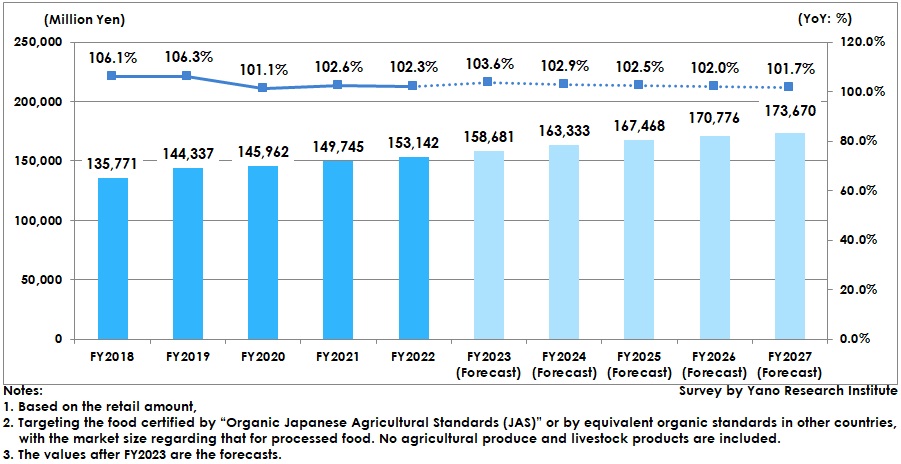No.3339
Organic/Natural Food Market in Japan: Key Research Findings 2023
Domestic Organic Food Market Grew at a CAGR of 3.1% from FY2018 to FY2022
Yano Research Institute (the President, Takashi Mizukoshi) has conducted a survey on the domestic organic and natural food market and has found out the market trend, trend of market players, and future perspectives. This paper focuses on the organic food market size.

Market Overview
With the compound annual growth rate (CAGR) from FY2018 to FY2022 attaining 3.1%, the estimated domestic organic food market size by retail amount for FY2022 has reached 153,142 million yen, up by 2.3% from the preceding fiscal year.
The market growth has slowed down, considering that the market used to enjoy 6% of growth rate before the corona crisis when organic supermarkets and natural food stores increased in anticipation of the summer Olympic & Paralympic games in Tokyo. Yet, the market is still on the rise with 2% of annual growth rate.
FY2020 saw disruptions in global distribution amid the corona crisis, which led to container shortages and to failure of procuring imported products as planned. Although improvement was observed in the latter half of the fiscal year, the market size remained to the level of usual years.
FY2021 was still under the influence of corona crisis, keeping people to dine at home, which not only encouraged the market to obtain stay-home spending, but also many people to review their dietary life, affecting their choices to natural foods with few additives or organic foods. This worked positively for the market.
FY2022 saw the special demand from stay-home spending to quieten down, but a part of consumption behaviors that is to adopt organic or natural foods in daily lives seemed to have remained. Due to fluctuated exchange rates and soaring food prices, the price of organic foods rose to increase the shipment value. All these seemed to have contributed to the organic food market expansion.
Noteworthy Topics
Boosted by “Strategy for Sustainable Food Systems, MIDORI” Promotions, Shift to Organic Farming Expanded
The promotion of “Strategy for Sustainable Food Systems, MIDORI” by the Ministry of Agriculture, Forestry, and Fisheries (MAFF) has gradually increased those farmers shifting to organic farming. After a three-year conversion period needed for the land used for conventional farming to switch to that for organic farming, the distribution volume of Organic JAS certified agricultural produce is expected to increase. Motivated by the sustainable food system strategy led by the government, producers have been energized to make something organic through organic farming. In line with such moves, product development for organic foods has invigorated in the processed food field.
Future Outlook
The organic food market for FY2023 is expected to expand by 3.6% from the previous fiscal year to 158,681 million yen. The market is forecasted to continue growing at the rate of 2 to 3%. The price revisions in the previous fiscal year have somewhat affected the sales in volume, but as the revisions permeate the sales are expected to upturn. As organic liquor has been added to the Organic JAS items, some retailers are showing full-scale development in their organic liquor business in FY2023, which is projected to work positively for the organic food market.
Imported foods that have driven the organic food market to date because of price advantage have become less attractive due to depreciated yen, and the price difference with domestically produced organic foods is shrinking. It is likely for the demand for future organic food market to polarize between the demand for more affordable imported products and the demand for domestic organic foods.
Research Outline
2.Research Object: Market entrants related to organic and natural food, corporate demanders of organic and natural foods such as retailers dealing in organic foods, ready-to-eat food businesses and food service providers that use organic foods in their offerings, as well as municipalities that propel organic food strategies.
3.Research Methogology: Face-to-face interviews (including online) by specialized researchers, surveys via telephone, and questionnaire
Organic Food
Organic food is defined as the food certified by “Organic Japanese Agricultural Standards (JAS)” or by equivalent organic standards in other countries.
The Organic Food Market
The organic food market in this research targets processed food including liquor, beverage, processed meat products, agricultural processed food, noodles, condiments, frozen food, other processed foods (retort pouch food, confectionery/desserts, cereals, supplements, etc.) The market size is calculated based on the retail amount. No agricultural produce or livestock products are included.
Organic-Friendly Food
Organic-friendly food is defined as the processed food that have used organic ingredients, though the final product is not organic JAS certified.
<Products and Services in the Market>
Organic/Natural Foods
Published Report
Contact Us
The copyright and all other rights pertaining to this report belong to Yano Research Institute.
Please contact our PR team when quoting the report contents for the purpose other than media coverage.
Depending on the purpose of using our report, we may ask you to present your sentences for confirmation beforehand.